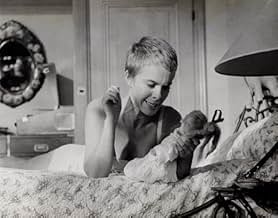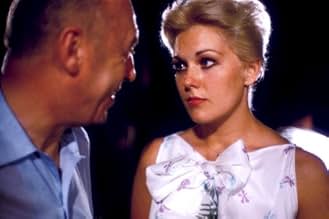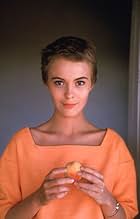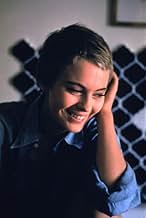IMDb-BEWERTUNG
6,8/10
6008
IHRE BEWERTUNG
Cecile, ein dekadentes junges Mädchen, das bei ihrem reichen Playboy-Vater Raymond lebt. Als Anne, Raymonds alte Liebhaberin, in Raymonds Villa kommt, hat Cecile Angst um ihre Lebensweise.Cecile, ein dekadentes junges Mädchen, das bei ihrem reichen Playboy-Vater Raymond lebt. Als Anne, Raymonds alte Liebhaberin, in Raymonds Villa kommt, hat Cecile Angst um ihre Lebensweise.Cecile, ein dekadentes junges Mädchen, das bei ihrem reichen Playboy-Vater Raymond lebt. Als Anne, Raymonds alte Liebhaberin, in Raymonds Villa kommt, hat Cecile Angst um ihre Lebensweise.
- Regie
- Drehbuch
- Hauptbesetzung
- Nominiert für 1 BAFTA Award
- 2 Nominierungen insgesamt
Tutte Lemkow
- Pierre Schube
- (Nicht genannt)
Maryse Martin
- Undetermined Secondary Role
- (Nicht genannt)
Edouard F. Médard
- Bit part
- (Nicht genannt)
Jackie Raynal
- Dancer
- (Nicht genannt)
Empfohlene Bewertungen
This is an absorbing, intriguing and slightly bizarre film. I agree with the other comments here - the camera work is beautiful, the Riviera looks fab, Seberg is startling, and David Niven (how come no-one's mentioned his performance yet?) is a particularly slimy, lecherous old man. Seberg really does deliver an excellent performance. She's a fascinating person anyway, and here her ambiguity, her modernity, her beauty and her youth all come into their own. And the title song's fab too! Well worth a watch, if only to revel in the stunning scenery and Seberg's haunting screen presence.
A good-for-nothing, unhappy high society girl recalls a summer when she destroyed the love of her rich playboy father and his respectable bride, because she was afraid of finishing their hedonistic lifestyle.
Well-acted, starry cast and very graciously made but, in atmosphere, oddly faithless adaptation of a sharply cynical novel, which tends to glamorize and ennoble its originally unlovable characters against luxurious backgrounds. It holds the interest, however, and the glossily colorful photography of the sunlit French Rivera in the past alternating with the bleakly black and white present, is particularly excellent.
Well-acted, starry cast and very graciously made but, in atmosphere, oddly faithless adaptation of a sharply cynical novel, which tends to glamorize and ennoble its originally unlovable characters against luxurious backgrounds. It holds the interest, however, and the glossily colorful photography of the sunlit French Rivera in the past alternating with the bleakly black and white present, is particularly excellent.
Wealthy playboy father and his precocious seventeen-year old daughter share a sassy, flirty relationship with one another while teasing and leading-on potential romantic partners for both. But the fun and games are called to a halt once dad is reunited with an old friend of the family, a chic fashion designer who would like to see both father and daughter get serious about their lives. Talented writer Arthur Laurents adapted his screenplay from Françoise Sagan's book, yet even with Otto Preminger directing a classy cast, this soaper set on the Riviera never comes to a boil. Preminger sees the idle rich as spoiled and decadent, dancing away mindlessly into the night, yet the players (David Niven and gamine Jean Seberg as father and daughter, Deborah Kerr as Niven's fiancée) bring a lot more heart and human interest to the piece than was probably intended. As such, the characters are more embraceable than the writing and handling, and portions of the film are puzzling or awkward. Still, film-lovers of this era in cinema will no doubt bask in the lush surroundings, not to mention in the enjoyable performances and beautiful photography (black-and-white for the present day, color for the past). The script might have benefited from more honesty in the finale--the 'irony' in bringing these dead-end lives full circle isn't very cutting--and there are two supporting characters who are given the shaft by Laurents. There are certainly pleasures to be had here, however, most notably in the scenes between Kerr and Seberg. **1/2 from ****
David Niven and Jean Seberg say "Bonjour Tristesse" in this 1958 film directed by Otto Preminger and also starring Deborah Kerr and Mylène Demongeot. Niven and Seberg are Raymond and Cecile, a father and daughter vacationing on the Riviera and having a superficial blast for themselves. Raymond has his current girlfriend Elsa (Demongeot) living with them as well.
When a good friend of Raymond's late wife, Anne (Kerr) comes to visit, things change - at first for the better, as the four of them continue the party atmosphere. Later, when Anne becomes Raymond's fiancée and begins to discipline Cecile, the fun stops. Cecile decides that Anne will have to go.
The film is told in flashback, black and white representing the present and glorious color used to tell the story, which is narrated by Seberg.
There's lots about this movie that is fascinating, and some of it just sort of falls flat. The idea that a deep-thinking, responsible career woman comes into the lives of two bon vivants is an interesting one, and you couldn't ask for a better cast.
The beginning of the film, and even Cecile's plan to get rid of Anne that she brings Elsa and her own boyfriend Phillipe in on has a lighthearted feel to it. What Raymond and Cecile never considered is that there are ramifications for actions, Cecile due to her immaturity and Raymond because he's Raymond.
David Niven is terrific as the dashing Raymond, who loves a party, and Deborah Kerr gives a warm performance as Anne, who truly loves him and wants to ground both him and his daughter. The curiosity here is Seberg. She is as always the perfect gamine. Any time she's in a scene, you can't take your eyes off of her. She's so darn beautiful. Yet I don't think I've ever heard her say one line that I believed. And she's one actress where it just doesn't seem to matter. We hear a lot about "it" - well, she really had it.
Gorgeous scenery - you want to leave for the Riviera immediately. And, truth to tell, spending some time with Raymond, Cecile and Elsa before the arrival of Anne wouldn't be bad either.
When a good friend of Raymond's late wife, Anne (Kerr) comes to visit, things change - at first for the better, as the four of them continue the party atmosphere. Later, when Anne becomes Raymond's fiancée and begins to discipline Cecile, the fun stops. Cecile decides that Anne will have to go.
The film is told in flashback, black and white representing the present and glorious color used to tell the story, which is narrated by Seberg.
There's lots about this movie that is fascinating, and some of it just sort of falls flat. The idea that a deep-thinking, responsible career woman comes into the lives of two bon vivants is an interesting one, and you couldn't ask for a better cast.
The beginning of the film, and even Cecile's plan to get rid of Anne that she brings Elsa and her own boyfriend Phillipe in on has a lighthearted feel to it. What Raymond and Cecile never considered is that there are ramifications for actions, Cecile due to her immaturity and Raymond because he's Raymond.
David Niven is terrific as the dashing Raymond, who loves a party, and Deborah Kerr gives a warm performance as Anne, who truly loves him and wants to ground both him and his daughter. The curiosity here is Seberg. She is as always the perfect gamine. Any time she's in a scene, you can't take your eyes off of her. She's so darn beautiful. Yet I don't think I've ever heard her say one line that I believed. And she's one actress where it just doesn't seem to matter. We hear a lot about "it" - well, she really had it.
Gorgeous scenery - you want to leave for the Riviera immediately. And, truth to tell, spending some time with Raymond, Cecile and Elsa before the arrival of Anne wouldn't be bad either.
The films of Otto Preminger share for the most part a detached objectivity in their attitudes to character and moral issues
In "Bonjour Tristesse," his gamine protégé Cecile (Jean Seberg) is a very peculiar girl, maybe spoiled and willful and arrogant and lazy
Anne (Deborah Kerr) had made her look at herself for the first time in her life And that turned her against her And now, her father is not having fun anymore, which was probably another reason she decided to get rid of her How carefully and how seriously she went about that decision, is the tale of Françoise Sagan, published in 1954, by the time she was nineteen
Raymond (David Niven) is a bundle of surprises For him, it's such a wonderful fun to have Cecile for a daughter And loving Anne doesn't mean that he loves his daughter any less The wealthy playboy becomes serious from the moment that Anne arrived He could never think of her as just someone to have fun with He does have fun with Elsa (Mylène Demongeot) but that's a long way from being all he wants Now, he has never wanted any woman the way he wants Anne
Anne spent her honeymoon by the sea 12 years ago She had quite a debate with herself before coming down to the French Riviera For knowing that Elsa was there, she got stupidly angry and decided to leave Then the prospect of packing and looking for a hotel was too much after that long drive so she decided to stay
Being too sophisticated (maybe for discovering occupied territory), Anne was as suspicious of summer as she was of Raymond in spite of the fact that she knew him 15 years ago, and was quite sure that with him, nobody is safe
For Cecile, Anne is prim and prissy and prude For a woman who hates vulgaritieseven when they're funnyshe could never be seriously interested in a man like her father So part of her was angry, part was happy, all of her was excited Her father had brought a girl to the seashore, made her go out in the sun and then when she was a mess of peeling, dropped her like a hot lobster It was unfair Yet even while she was angry at him, she was proud that he had gotten the unattainable Anne Anne looks now softer She moves easier In the morning, she seems as though she had the most wonderful secret in the world
Suddenly she becomes aware of a great responsibility towards Cecile, as it would be good if she stops seeing Philippe (Geoffrey Horne) and studies for her philosophy examination
Cecile becomes furious at her interference Anne wants her to study and not to see Philippe So what shall it be? For her, there'll be a man to take care of her And she doesn't need a diploma for that
Now she hates Anne For her, she has changed her father She'll change her and will change everything
In "Bonjour Tristesse," his gamine protégé Cecile (Jean Seberg) is a very peculiar girl, maybe spoiled and willful and arrogant and lazy
Anne (Deborah Kerr) had made her look at herself for the first time in her life And that turned her against her And now, her father is not having fun anymore, which was probably another reason she decided to get rid of her How carefully and how seriously she went about that decision, is the tale of Françoise Sagan, published in 1954, by the time she was nineteen
Raymond (David Niven) is a bundle of surprises For him, it's such a wonderful fun to have Cecile for a daughter And loving Anne doesn't mean that he loves his daughter any less The wealthy playboy becomes serious from the moment that Anne arrived He could never think of her as just someone to have fun with He does have fun with Elsa (Mylène Demongeot) but that's a long way from being all he wants Now, he has never wanted any woman the way he wants Anne
Anne spent her honeymoon by the sea 12 years ago She had quite a debate with herself before coming down to the French Riviera For knowing that Elsa was there, she got stupidly angry and decided to leave Then the prospect of packing and looking for a hotel was too much after that long drive so she decided to stay
Being too sophisticated (maybe for discovering occupied territory), Anne was as suspicious of summer as she was of Raymond in spite of the fact that she knew him 15 years ago, and was quite sure that with him, nobody is safe
For Cecile, Anne is prim and prissy and prude For a woman who hates vulgaritieseven when they're funnyshe could never be seriously interested in a man like her father So part of her was angry, part was happy, all of her was excited Her father had brought a girl to the seashore, made her go out in the sun and then when she was a mess of peeling, dropped her like a hot lobster It was unfair Yet even while she was angry at him, she was proud that he had gotten the unattainable Anne Anne looks now softer She moves easier In the morning, she seems as though she had the most wonderful secret in the world
Suddenly she becomes aware of a great responsibility towards Cecile, as it would be good if she stops seeing Philippe (Geoffrey Horne) and studies for her philosophy examination
Cecile becomes furious at her interference Anne wants her to study and not to see Philippe So what shall it be? For her, there'll be a man to take care of her And she doesn't need a diploma for that
Now she hates Anne For her, she has changed her father She'll change her and will change everything
Wusstest du schon
- WissenswertesOtto Preminger always liked this film, although he felt the American critics did not do it justice. The film was a qualified success in France, yet American critics felt the film wasn't French enough, a detail that amused Preminger.
- PatzerWe hear the Band at c.6'50" and we see a clarinet-player performing, but the music has no clarinet part whatsoever included at that point in the soundtrack. Later, when the clarinet does eventually join the soundtrack, the fingering of the player bears absolutely no relation to the music actually being heard.
- VerbindungenEdited into Geschichte(n) des Kinos: Une histoire seule (1989)
Top-Auswahl
Melde dich zum Bewerten an und greife auf die Watchlist für personalisierte Empfehlungen zu.
Details
Box Office
- Weltweiter Bruttoertrag
- 446 $
- Laufzeit1 Stunde 34 Minuten
- Farbe
- Seitenverhältnis
- 2.35 : 1
Zu dieser Seite beitragen
Bearbeitung vorschlagen oder fehlenden Inhalt hinzufügen

Oberste Lücke
By what name was Bonjour Tristesse (1958) officially released in India in English?
Antwort


































